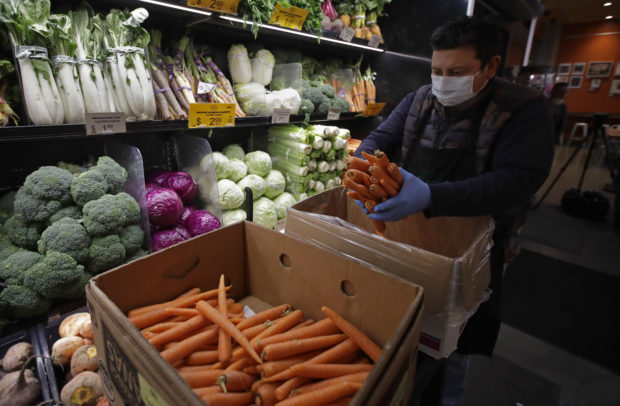Why health experts aren’t warning about coronavirus in food
NEW YORK — Chicken with salmonella can make you sick. So can romaine lettuce with E. coli and buffets with lurking norovirus. So why aren’t health officials warning people about eating food contaminated with the new coronavirus?

A worker, wearing a protective mask and gloves against the COVID-19 coronavirus, stocks produce before the opening of Gus’s Community Market, Friday, March 27, 2020, in San Francisco. Health experts say there’s no evidence the new coronavirus is spread through food. That’s because organisms take different biological paths to sicken people. (AP Photo/Ben Margot)
The answer has to do with the varying paths organisms take to make people sick.
Respiratory viruses like the new coronavirus generally attach to cells in places like the lungs. Germs like norovirus and salmonella can survive the acid in stomachs, then multiply after attaching to cells inside people’s guts.
“Specializing in what tissues to attach to is typically part of the disease’s strategy to cause illness,” according to the U.S. Centers for Disease Control and Prevention.
The CDC and other experts note that the virus is new and still being studied. But they say there’s no evidence yet that COVID-19 sickens people through their digestive systems, though the virus has been detected in the feces of infected people.
How these germs spread also differs.
Article continues after this advertisementRespiratory viruses like the flu and the new coronavirus spread mainly through person-to-person contact and air droplets from coughing, sneezing or other flying saliva.
Article continues after this advertisementGerms that make people sick through food cause symptoms like diarrhea. In some cases, germs in the feces can capitalize on poor hygiene to jump from people’s hands to whatever else they touch.
That’s why it’s so important for food workers to stay home when they are sick with digestive illnesses: There’s a big risk the restaurant could end up sickening lots of people.
When it comes to food and COVID-19, experts say the biggest risk is contact in grocery stores with other customers and employees, rather than anything you eat. It’s why stores are limiting the number of people they let in, asking customers to practice social distancing and using tape to mark how far apart people should stand.
The new virus can survive on some surfaces, so experts say to keep your hands to yourself as much as possible and to avoid touching your face when shopping. After unpacking your groceries at home, the CDC suggests washing your hands.
It may be harder for viruses to survive on food itself.
“It’s a porous surface. The chances of anything surviving or coming out of it are small,” said Alison Stout, an expert in infectious diseases and public health at Cornell University.
As for the coronavirus being found in the stool of infected people, the CDC notes that it’s not known whether the germs found there can actually sicken someone. Stout said the presence of the virus in the stool is more likely a reflection of systemic infection, rather than its ability to survive the digestive tract.
GSG
For more news about the novel coronavirus click here.
What you need to know about Coronavirus.
For more information on COVID-19, call the DOH Hotline: (02) 86517800 local 1149/1150.
The Inquirer Foundation supports our healthcare frontliners and is still accepting cash donations to be deposited at Banco de Oro (BDO) current account #007960018860 or donate through PayMaya using this link.